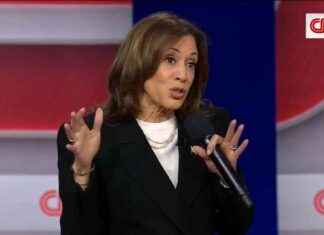North Korean head of state Kim Jong Un’s devotion to military parades is well known. But this Tuesday it was his counterpart Yoon Suk Yeol who presided over the first military parade in South Korea in a decade. Despite the rain, the tanks once again paraded through the streets of Seoul, as a symptom of the rise in temperature on the Korean peninsula since the right-wing Yoon narrowly won the elections, a year and a half ago.
Although bad weather discouraged the display of state-of-the-art helicopters and F-35 and KAI-21 fighter-bombers, ballistic missiles – another Korean fixation – anti-missile systems, drones and other American or South Korean-made weapons occupied the streets of the capital, together with the infantry, on the occasion of the “75th anniversary of the army.”
Also participating in the parade were 300 of the 28,500 US troops currently stationed in the country, whose presence dates back to the war that divided Korea. Their travel was easy, since the largest US military base abroad, Camp Humphreys, is just 40 kilometers from Seoul. In 2018, when it was inaugurated with an area of ??almost 500 hectares – with four schools and five churches – the South Koreans had assumed 92% of its bill, about 10 billion dollars.
The highlight of yesterday’s parade was the two kilometers through one of the capital’s main avenues, to the historic Gwanghwamun portal, which was dominated by the gigantic colonial building of the Japanese General Governorate until its demolition in 1996.
Although South Korea used to hold this show of force once every five years, the 2018 parade was suspended by the previous Democratic Party government in a gesture of goodwill toward Pyongyang. It should be remembered that the American president, Donald Trump, was then flirting with the dictator Kim Jong Un, with whom he met on two occasions (one of them, on the same border).
In his speech on Tuesday, Yoon Suk Yeol warned North Korea against using nuclear weapons: “If you do, your regime will be liquidated.” At the same time, his government insists on strengthening “military cooperation with the United States,” which could include the installation of American nuclear weapons. Ostensibly to deter Pyongyang – which has some nuclear warheads and even intercontinental missiles – but at a relatively short distance from the Russian Far East and China.
President Yoon has also pledged to increase defense spending. He made his debut, however, fulfilling his anti-feminist promise to abolish the Ministry of Gender Equality, while continuing to work to increase the work week from 52 hours to 69.
However, his People Power Party is in a minority in parliament – and will remain so at least until the April 2024 elections – where the opposition Democratic Party has more deputies.
Despite this, Yoon Suk Yeol managed last week to have the House lift the immunity of opposition leader Lee Jae Myung, paving the way for his request for prosecution by his successor as state attorney general – Yoon held the position until 2021 – due to corruption accusations.
Lee, a center-left politician in favor of rapprochement between the two Koreas, has been on hunger strike for 24 days – even being hospitalized – in protest of what he considers the repression of the media and freedoms by the Yoon government . Just yesterday he had to appear in court – with members of the public for and against – to see how the judge finally rejected the request to arrest him, considering that there was no risk of escape or destruction of evidence.
Almost simultaneously, another magistrate has lifted the ban that had existed for a few years on sending hot air balloons loaded with anti-communist propaganda wrapped in dollar bills to North Korea.
Pyongyang does not take lightly either the proclamations coming from Seoul or what it considers the crossing of several red lines. For example, with the presence, this year, of American nuclear aircraft carriers in Korean waters. These actions would have placed the Korean peninsula “closer to a nuclear war,” according to Pyongyang’s spokesman at the UN, the same day that its secretary general, António Guterres, warned against “a new nuclear race.”
Yoon has also spectacularly improved relations with the former occupying power, Japan, with the implementation of more military maneuvers – commanded by the United States – and with a thunderous silence regarding the dumping of radioactive waters from Fukushima, highly criticized by some of the public. South Korean.
Just as the end of the Cold War allowed the reunification of Germany, this was not the case with Korea. This is once again moving away with the fight for hegemony in Asia between China, on the one hand, and the United States and the countries in its orbit, on the other. A policy in which Yoon and his hard line against the eccentric North Korean communist regime fit like a glove.
Although a demonstration near the military parade on Tuesday, under the banner “Stop the arms race”, shows that there is no consensus.
In parallel to all of the above, North Korea is strengthening its military cooperation with Moscow, as demonstrated by the visit of Russian Defense Minister Sergei Shoigu to Pyongyang this summer, and the even more recent meeting in Russia between Kim Jong Un and his counterpart Vladimir Putin.








